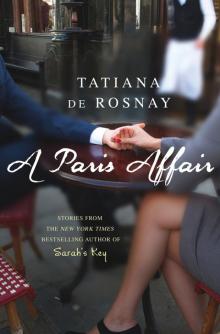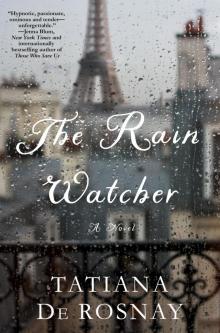- Home
- Tatiana de Rosnay
The Rain Watcher
The Rain Watcher Read online
Begin Reading
Table of Contents
About the Author
Copyright Page
Thank you for buying this
St. Martin’s Press ebook.
To receive special offers, bonus content,
and info on new releases and other great reads,
sign up for our newsletters.
Or visit us online at
us.macmillan.com/newslettersignup
For email updates on the author, click here.
The author and publisher have provided this e-book to you for your personal use only. You may not make this e-book publicly available in any way. Copyright infringement is against the law. If you believe the copy of this e-book you are reading infringes on the author’s copyright, please notify the publisher at: us.macmillanusa.com/piracy.
For my family
And the stars look very different today
—David Bowie, “Space Oddity,” 1969
ONE
Je passais au bord de la Seine
Un livre ancien sous le bras
Le fleuve est pareil à ma peine
Il s’écoule et ne tarit pas
—GUILLAUME APOLLINAIRE, “MARIE”
I will start with the tree. Because everything begins, and ends, with the tree. The tree is the tallest one. It was planted way before the others. I’m not sure how old it is, exactly. Perhaps three or four hundred years old. It is ancient and powerful. It has weathered terrible storms, braced against unbridled winds. It is not afraid.
The tree is not like the others. It has its own rhythm. Spring starts later for it, while all the others are already blossoming. Come late April, the new oval leaves sprout slowly, on the top and middle branches only. Otherwise, it looks dead. Gnarled, gray, and withered. It likes to pretend to be dead. That’s how clever it is. Then, suddenly, like a huge explosion, all the buds flourish. The tree triumphs with its pale green crown.
No one can find me when I’m up here. I don’t mind the silence. It’s not really silence, because so many small sounds fill it. The rustle of the leaves. The moan of the wind. The buzz of a bee. The chirp of the cicadas. The flutter of a bird’s wing. When the mistral is up and rushes through the valley, the thousands of branches swishing sound like the sea. This is where I came to play. This was my kingdom.
I tell this story now, once, so that I don’t have to tell it again. I am not good with words, whether they are spoken or penned. When I’m finished, I will hide this. Somewhere where it won’t be found. No one knows. No one will. I’ve never told it. I will write it and not show it. The story will remain on these pages, like a prisoner.
“IT’S BEEN LIKE THIS for the past two weeks,” says the listless taxi driver. The rain pours down, a silver curtain, hissing, obstructing all daylight. It is only ten o’clock in the morning, but to Linden, it feels like dusk glimmering with wetness. The taxi driver says he wants to move away for good, flee Paris, find the sun, go back to balmy Martinique, where he is from. As the car leaves Charles de Gaulle Airport and edges along the jammed highway and ring road that circles the city, Linden cannot help agreeing with him. The sodden suburbs are dismal, clustered contours of cubic volumes bedecked with garish neon billboards flickering in the drizzle. He asks the driver to turn on the radio, and the man comments upon his perfect French, “for an American.” Linden grins. This happens every time he returns to Paris. He replies he’s Franco-American, born in France, French father, American mother, he speaks both languages fluently, with no accent at all. How about that, eh? The driver chortles, fumbles with the radio, well, monsieur certainly looks like an American, doesn’t he, tall, athletic, jeans, sneakers, not like those Parisians with their fancy ties and suits.
The news is all about the Seine. Linden listens while squeaky windshield wipers thrust away rivulets in a never-ending battle. The river has been rising for five days now, since January 15, lapping around the Zouave’s ankles. The huge stone statue of a colonial soldier situated just below the pont de l’Alma is, Linden knows, the popular indicator of the river’s level. In 1910, during the major overflows that inundated the city, the water had crept all the way up to the Zouave’s shoulders. The driver exhales, there’s nothing to be done to prevent a river from flooding, no use fighting nature. Men need to stop tampering with nature; all this is her way of lashing back. As the car inches along sluggish circulation, unrelenting rain pounding on the car roof, Linden is reminded of the email the hotel sent him on Tuesday.
Dear Mr. Malegarde,
We are looking forward to your arrival and stay with us as from Friday, January 19th, at noon, until Sunday, January 21st, in the evening (with a late checkout, as requested). However, the traffic situation in Paris might be problematic due to the level of the river Seine. Fortunately, the Chatterton Hotel, situated in the fourteenth arrondissement, is not located in an area liable to inundations, and therefore will not be concerned by the inconvenience. For the moment, the prefecture informs us there is nothing to worry about, but our policy is to update our guests. Please let us know if you need any assistance. Kind regards.
Linden read it at the airport on his way from L.A. to New York, where he was booked to photograph a British actress for Vanity Fair. He forwarded the message to his sister, Tilia, in London, and to his mother, Lauren, in the Drôme valley, who were to join him in Paris that Friday. Linden had not included Paul in the email because his father only appreciated letters and postcards, not emails. His sister’s answer, which he received when he landed hours later at JFK, made him chuckle. Floodings?! What?! Again? Don’t you remember there was already a scary flood in Paris last November? And what about the one in June 2016? It took us years to organize this bloody weekend, and now this?! She signed off with a series of scowling emoticons. Later, his mother replied to both of them: Will come by boat if we have to, dragging your father away from his trees! To at last be together! No way will we cancel this family gathering! See you on Friday, my loves! The Malegarde family was meeting in Paris to celebrate Paul’s seventieth birthday, as well as Lauren and Paul’s fortieth wedding anniversary.
Linden had not given the hotel’s warning another thought. When he left New York for Paris on Thursday evening, he felt weary. It had been two full days, and before that, weeks of hard work around the globe. He would have preferred to fly back home to San Francisco, to Elizabeth Street, to Sacha and the cats. He had not seen much of Sacha, nor the cats, in the past month. Rachel Yellan, his dynamic agent, had landed him one job after the other, a dizzying swirl from city to city that left him depleted and longing for a break. The narrow blue house in Noe Valley and its cherished inhabitants would have to wait until this special family event was over. “Just the four of us,” his mother had said, all those months ago, when she had booked hotel and restaurant. Was he looking forward to this? he wondered as the plane took off. They had not often been together, just the four of them, since his teenage years at Sévral, where he grew up, and more so, since he had left Vénozan, his father’s familial domain, in 1997, at nearly sixteen. He saw his parents once or twice a year, and his sister whenever he went to London, which was frequently. Why did “just the four of us” sound both so cozy and ominous?
On the flight to Paris, Linden read Le Figaro and realized with a jab of apprehension that the situation described by the hotel was, in fact, disquieting. The Seine had already flooded in late November, as Tilia pointed out, after a wet summer and autumn, and previously, in June 2016. Parisians had kept a wary eye on the Zouave, and the little waves lapping up his shins. Fortunately, the flow had stopped increasing. Le Figaro explained that thanks to modern technology, one could predict the river’s engorgement three days ahead, which left ample time for evacuating. But the actual prob
lem was the torrential rain, which had not lessened. The river was on the rise again, and threateningly fast.
After traffic jams and more foreboding talk on the radio, the taxi crosses the Seine at Concorde. It is raining so thickly, Linden can barely make out the river below, just enough to notice the churning flow seems unnaturally foamy. The taxi crawls along waterlogged boulevard Saint-Germain and boulevard Raspail, and reaches the Hôtel Chatterton at Vavin crossroad. In the one minute it takes Linden to leap from car to entrance, the rain plasters his dark blond hair to his head, dribbles down the back of his neck, seeps into his socks. The chilly winter air enfolds him and seems to follow him into the lobby. He is greeted by a smiling receptionist, he smiles back, hair dripping, shivering, hands her his French passport (he has two), nods back at “Bienvenue, Monsieur Malegarde.” Yes, his sister is arriving later on today by Eurostar, and his parents from Montélimar by train. No, he’s not quite sure at what time. Is he aware that his parents’ train will be diverted to Montparnasse and not be arriving at Gare de Lyon, because of the inundation risks? No, he knows nothing of this. But that will make it much more practical, he realizes, as Montparnasse station is barely five minutes away from the Chatterton.
The receptionist, whose badge reads AGATHE, gives him his passport and room key, and tells him, not too effusively, how much she admires his work, what an honor it is to have him at the hotel. Is he here for fashion week as well? she inquires. He thanks her, then shakes his head, explains this is a family weekend, that he will not be working, not a single shoot scheduled for the next few days, a well-deserved rest. He has only one camera with him, he tells her, his beloved vintage Leica; he left his gear in New York, with his agent, and the only people he plans to photograph are his parents and sister. As for fashion week, that’s certainly not on his list; he’ll leave those glitzy creatures tottering on their stilettos to their own confederacy of glamour and catwalks. The receptionist laughs. She heard on TV that if the Seine continues to rise so alarmingly, fashion week might be canceled. Now it is Linden’s turn to snort, and he feels a furtive pang of guilt, and cannot help thinking of what it would mean to actually cancel fashion week, which starts tomorrow, what a colossal waste of effort, time, and money. The receptionist then refers deferentially to his father and says what a pleasure it is to have “Mr. Treeman” with them, and Linden is amused at her fervor (little does she know how much his father resents that sobriquet, how ridiculous he finds it, and with what difficulty he deals with his illustriousness); his father is such a respected figure, she goes on; his struggle to save notable trees around the world is admirable. He warns her, genially, that his father is shy, not easygoing and talkative like himself; however, she’ll have a ball with his mother, who is the true star of the family, and his sister, Tilia Favell, is quite a number, as well.
The room on the fourth floor, giving onto rue Delambre, is warm, comfortable, and prettily furnished in tints of lilac and crème, although a trifle small to accommodate his long-limbed frame. A basket of goodies awaits on the table—fresh fruit, roses, chocolates, and a bottle of champagne on ice—with a handwritten welcome note from the hotel’s director, Madame Myriam Fanrouk. He remembers his mother choosing the Chatterton two years ago when she decided to go ahead with the anniversary and birthday weekend. It was labeled a “charming, delightful boutique hotel on the Left Bank, bang in the heart of Montparnasse” and TripAdvisor comments were positive. Linden had left the organization up to her. He had booked his flights when he was sure of his agenda, not an easy feat for a freelance photographer. Lauren had also picked the place they were having dinner tomorrow night, Villa des Roses, a one-star Michelin restaurant on rue du Cherche-Midi, behind the Hôtel Lutetia.
Why Paris? he wonders as he unpacks his small suitcase and hangs up the dark green velvet jacket he’ll be wearing tomorrow evening. Tilia is based in London with her daughter and her second husband, art expert Colin Favell; Lauren and Paul live in Vénozan, near Sévral, in the Drôme valley, and he is established in San Francisco, with Sacha. Yes, why Paris? Paris does not mean much to his parents. Or does it? Linden gives it a thought as he undresses, casts aside his damp clothes, and steps under a hot shower with relish. He knows his parents met in Grignan, during the ferocious heat wave that desiccated France in the summer of 1976, when Paul was working as head landscaper for an ambitious garden-design firm on the outskirts of the small town. Tilia and he know the story inside out. Lauren, barely nineteen, was visiting France for the first time with her sister Candice, two years older. Born and bred in Brookline, Massachusetts, they had never been to Europe. They started with Greece, then Italy, and made their way up through France via Nice, Avignon, Orange. A halt in the Drôme had not been planned, but it had been too hot to pursue their route and they decided to spend one night in a modest but welcoming bed-and-breakfast in Grignan. At the end of the sweltering day, the sisters were enjoying a glass of chilled rosé in the shade of the cool square, where a fountain tinkled, beneath the statue of regal Madame de Sevigné, whose imposing château graced the top of the hill, when Paul drove by in his pickup. He wore faded white overalls that had a Steve McQueen aura to them, a frayed straw sun hat, and a roll-up cigarette jutted from his mouth. Lauren’s eyes followed him as he parked the truck and hauled various pots and shrubs from the trunk into a nearby shop. He was broad-shouldered and muscular, of medium height, and when he swept off the hat to wipe off a perspiring forehead, she noticed he had hardly any hair, just a segment of brown fuzz at the back of his head. Nearly bald, but young, not even thirty, she guessed. Candice asked why she was staring at the guy in the overalls, and Lauren whispered, “Just look at his hands.” Candice replied blankly that she couldn’t see anything special about his hands at all, and Lauren, in a sort of trance, murmured she had never seen anyone touch plants the way that man did. Their father, Fitzgerald Winter, was something of a gardener; so was their mother, Martha. The girls had grown up in a verdant, tree-filled neighborhood in Brookline, near Fisher Hill, where residents spent a lot of time tending to their gardens, with shears in one gloved hand and a watering can in the other, anxiously appraising a rosebush’s growth. But this man was different, and Lauren could not take her eyes off his robust, tanned fingers, watching the way he tilted his head to stare at each flower, how he caressed the branches and blossoms of every plant he handled, cupping it in a strong yet gentle hold that mesmerized her. Paul must have felt the pressure of her gaze, because he at last looked up and saw the two sisters sitting a little farther away. Tilia and Linden knew this part by heart, as well. He saw only Lauren, her legs, her long hair, her slanted eyes, although Candice was just as beautiful. He walked over to her table and silently handed her a small potted olive tree. She spoke hardly any French, and his English was nonexistent. Candice mastered French better than her sister, so she was able to translate, but to them she was invisible, just a voice choosing the right words. His name was Paul Malegarde, he was twenty-eight, and he lived a few kilometers away, near Sévral, on the road to Nyons. Yes, he loved plants, especially trees, and he had a beautiful arboretum on his property, Vénozan. Would she like to see it, perhaps? He could take her there, would she like that? Oh, but she was leaving tomorrow with her sister, off to Paris, and then London, and then back home at the end of the summer. Yes, she could maybe stay a bit longer; she had to see.… When Lauren got up to shake his proffered hand, she towered over him, but neither of them seemed to mind in the least. She liked his shrewd blue eyes, his infrequent smile, his long silences. “He’s not half as good-looking as Jeff,” said Candice later. Jeff was Lauren’s preppy Bostonian boyfriend. Lauren shrugged. She was meeting Paul again later, by the fountain. There was a full moon that night. The heat did not abate. Candice was no longer there to serve as translator, but they did not need her. There was not much talking. David Bowie, Paul’s favorite singer, sang from the cassette deck in the pickup as they gazed up at the stars, their hands barely touching. Jeffrey van der Haagen felt thousands o
f miles away. Lauren Winter did not make it to Paris, nor to London; nor did she go back to Boston at the end of that scorching summer of 1976. She visited Vénozan and ended up never leaving it.
Linden grabs a towel, dries himself, and slides into a bathrobe. He remembers his mother’s mentioning that meeting up in Paris was more convenient for the four of them. She was no doubt right. And this was to be a “no spouses, no children weekend,” she had pointed out. That meant no Colin, no Mistral (Tilia’s daughter from her first marriage), no Sacha. Just the four of them. He draws the curtain back and watches the rain cascade down to the gleaming pavement. Scarce passersby dash through the drops. His mother had scheduled several walks and visits to museums for tomorrow. The rain and cold will no doubt hamper her plans. A gloomy noon in Paris, and three o’clock in the morning in San Francisco. He thinks of Sacha sleeping in the large bedroom on the top floor, the tousled dark hair on the pillow, the gentle, regular breath. His phone pings and he turns to retrieve it from his coat pocket. Dude, have you arrived? Tilia always calls him “dude,” and he retaliates with “doll.” Doll, I’m in my room. Number 46.
Moments later, he hears an authoritative rap at the door and opens up. His sister stands there, drenched, hair flattened and dripping, eyebrows and lashes spiked with wobbling droplets. She rolls her eyes, outstretches her arms, and staggers forward like a zombie, which makes him laugh. They hug, and, as ever, she is small compared to him, small but robust, built exactly like their father, with the same broad shoulders, square jaw, the same quizzical blue eyes.
Whenever Linden and Tilia are together, they never know which language to choose. They grew up learning both at the same time, speaking English to their mother, French to their father, but between them, it is a confusing, rapid jumble of both, a Frenglish potpourri of slang and personal nicknames that give other people headaches. While Tilia dries her hair on a towel, then with the hair dryer, Linden notices she has put on weight since the last time he saw her, just before summer, when he was passing through London. But it suits her, this new plumpness, giving her a femininity she sometimes lacked. She had always been a tomboy, the kind of girl who climbs trees, plays pétanque with the men in the village, whistles with her fingers between her teeth, and swears like a pirate. She disregarded style, makeup, and jewelry, although Linden notices that today she is wearing a well-cut, if sopping, pair of navy blue trousers and matching jacket, attractive black boots, and a gold necklace. He compliments her on her appearance, and she mouths “Mistral” above the blast of the hair dryer. Her poised eighteen-year-old daughter, a fashion student born of a Basque father (a renowned chef), is Tilia’s fashion police, and it appears her efforts are paying off. Her hair now dry, Tilia walks across the room to turn on the TV, saying she wants to watch the news about the river, and Linden notices her limp is worse than usual.

 A Secret Kept
A Secret Kept Sarah's Key
Sarah's Key A Paris Affair
A Paris Affair The Other Story
The Other Story The House I Loved
The House I Loved The Rain Watcher
The Rain Watcher